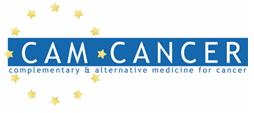

 |
 |
Concerted Action for Complementary and Alternative Medicine (CAM)
Assessment in the Cancer Field
CAM-CANCER Project
The use of complementary and alternative medicine (CAM) by cancer patients is reported to increase. The reasons why cancer patients use CAM are not fully understood. Possible explanations include that the cancer patients expect to cure the disease and to decrease the side effects of cancer treatments. At a psychosocial level, patients are facing fears about death and they are searching for support and hope. The challenge for oncologists is to give an objective and responsible answer to this type of demand. An informative dialogue should therefore be offered on all questions and needs of patients and their relatives. The patient autonomy should be respected but the oncologist has to discuss and negotiate a realistic and safe treatment plan with their patients. Oncologists need objective and independent information on CAM methods, especially on safety issues like side effects and possible interactions as well as a critical appraisal of medical evidence.
Rumours, the media, and the internet spread both accurate and inaccurate information at accelerating rates. The cancer patients and the public are flooded with information of highly variable quality about CAM. It is critical that both patients and physicians have access to reliable evidence-based information.
1) To build a European authoritative network around CAM in cancer with experts in CAM research, medical literature review, patient support & information and in cancer care.
2) The estimation of scientific evidence by the realisation of literature review and information search on CAM in cancer.
3) To produce and disseminate suitable evidence based information for health professionals in order to help them to inform their cancer patients.
(Pr W Weber, Dr F Jungi)
In order to bring in additional specific expertise and points of view, the representatives of oncology nurses, CAM practitioners and the cancer patients were appointed in the project Steering Committee.
The project was funded by the European Commission within the Fifth Framework of the “Quality of life and Management of Living Resources” program.
1) A web site (www.cam-cancer.org) featuring information for health professionals and online collaboration tools for project collaborators. This web site aims to provide a single access point to health professionals and cancer organisations searching for reliable information on CAM.
2) Systematic reviews according to Cochrane Collaboration guidelines. The topics are: Laetrile for the treatment of cancer, CAM for the treatment of breast cancer, the prevalence of CAM use by cancer patients, the use of selenium for the prevention and for the treatment of cancer, the quality of patient reported outcome in research on CAM in cancer.
3) CAM Summary. Peer-reviewed and up-to-date summaries of the existing scientific information on CAM in cancer. The CAM Summaries will provide information on the CAM background, promoter claims, safety issues, and efficacy. The CAM Summaries are designed for the use of the health professionals. The lay public is strongly advised to discuss any information from the site with their physician or other health professional contact.
CAM summaries are available on the following topics: Acupuncture for nausea, Acupuncture for pain, Boswellia, Breuss cancer cure, Cannabinoids, Carctol, Co-enzyme Q10, Essiac, Factor AF2, Galavit, Melatonin, Gerson diet, Green tea for cancer prevention, Hulda clark, Immucothel, Lacto-ovo vegetarian diet, Laetrile, Massage, Medicinal mushrooms, Megamin, Mistletoe, Plant-based for hot flushes, Rath, Shark cartilage, TCM for pancreatic cancer, Ukrain.
4) The project partners have developed a transparent methodology for writing and reviewing CAM Summaries. In addition, recommendations for preparing systematic reviews are proposed. All the methodological documents are available online from the project web site.
5) The EEA area and Switzerland (29 countries) were considered for an overview on CAM legal status entitled «How are European patients safeguarded when using complementary and alternative medicine (CAM)? Jurisdiction, supervision and reimbursement status in the EEA area (EU and EFTA) and Switzerland».
For more information, please visit the project web site www.cam-cancer.org or contact Mr Stéphane Lejeune, EORTC Data Center, Email: stephane.lejeune( at )eortc.be